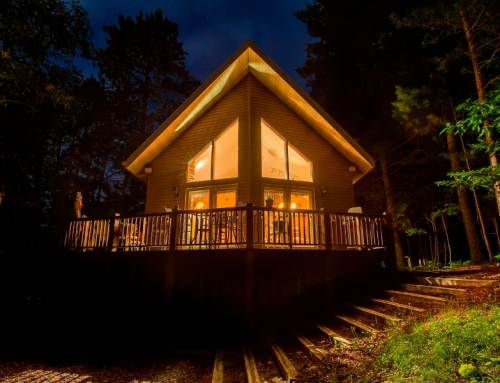To Gate Or Not To Gate
OK, you’ve identified your general lifestyle needs and the type of community you want to be the center of that lifestyle. Now whether you build or are buying an existing home, we now need to move on to more specific factors of where your home will be located.
My wife and I relocated from a Florida community near the ocean to the mountains of western North Carolina, so we have some experience with radical changes in retirement settings, and I hope this can be of some value to you.
Look around where you are now. What are the features you like about your neighborhood or the neighborhood of friends you visit? Make a list of what you like and don’t like where you are and use that as an outline, while keeping in mind where you are considering for the change in your lifestyle. It may be mountains, seashore, high desert, a resort community or wherever, but each has its own challenges and cautions. Other than the question about to gate or not to gate, we would recommend that you consider getting the answers to these questions in writing or confirm them yourself in letter to the realtor or owner you use. In the rare instance that there is a misunderstanding about the question, or a problem arises later, you have documentation to clarify any points of misunderstanding.
Specifically, if you are going to really enjoy your home, you need to know the answers to these questions:
What is the concept of the development community your are considering? You have always heard that the three things that determine a real estate investment are location, location, location. While location is critical, we believe that when considering an investment like this, the concept of the development you are looking at is equally important. What is the aim of the development? What did the developer want to achieve? Is it to have a country club-type atmosphere so that you will have all the amenities of the country club you may be a member of at present? Or is it to provide a more peaceful setting without the energy level (and expense) of a golf or tennis community? Is it an equestrian or fishing concept? You have already decided what it is you want to enjoy in your setting, so narrow your search to developments that provide or supplement those types of settings.
Gated or non gated community? Do you like knowing that people you see in your community are neighbors and guests? Does it worry you that people, not part of your community, can come in and look around at will? If so, you probably would like a gated community. If not, and you have other ways to protect your privacy, a gated community is probably not critical for you and your guests.
Is the development community infrastructure in and complete including cabling and utilities? Make sure that your utilities are already in and functioning. In newer developments still in early stages this might not be the case. If the utilities are yet to be installed, ask if they are underground (no unsightly wires ruining your view), and ask if the money to install them is escrowed or bonded to ensure your ability to use them when you need to. Also, if not already in and functioning, when are they scheduled to be completed?
What type of water supply do you have? (Wells, springs, municipal). How reliable is the water supply? When was the water last tested? If the water is from a well system, how deep is the well? What is the average flow per minute? One gallon per minute is 1440 gallons a day and a house uses at least 350-400 gallons of water per day, so you want to know how many houses share your well and will any more be added. When is the last time the well or spring went dry (if ever)? When was the last time the water was tested for various impurities (it should be checked annually at least)?
Septic and/or sewer access. Are the permits in, are the systems in, what is the cost of installing septic or hooking up to sewer? Is the septic pumped or gravity? What type of septic system? This gets a little complex if you have never had a home with a septic system and the services of a plumber may be worth retaining. Septic systems work very well and should give trouble free service so you never notice the difference from municipal sewage systems.
Are telephone service, cell phone service and television service available? Reception for these services can be uncertain in some parts of the country. There are booster systems available for cellular phones and satellites for television. However, your home will need to be positioned so that you can access these services.
Can deliveries get to your homesite? Remember that you will need to have materials and goods delivered to your home or homesite and they may have to come on large trucks. These could include appliances, building materials for construction or remodeling, and landscaping items as well as your household goods and furnishings when you move in. Particularly in mountain settings you may find that these trucks cannot negotiate the turns or there are low hanging branches or trees that allow a car to pass, but would be impossible for a semi-trailer truck or concrete truck to negotiate. In that case, those materials and goods will need to be unloaded and carried to the house in smaller vehicles or by hand. Also remember that if the truck can get to your home, they will need room to turn around.
What, if any, are annual fees at the community? This is pretty obvious, but still, it can come as a surprise if you don’t ask. Do those fees cover items like common area maintenance, clearing roads, security, caretaker, etc.? Are there additional fees for golf, tennis, etc.?
What wildlife is in the area? Local fauna is fun and you want to know what is around and what its habits are. Most everyone is familiar with bear and concerned about bear being attracted to bird feeders or garbage left out. Others to ask about are deer, foxes, raccoons, coyotes, and snakes. Local hiking shops or outfitters can tell you what lives in your area and what precautions, if any, you should take. Of course the forest service is very helpful as well.
What are the views from your homesite in each of the four seasons? Each season in many locations has its own beauty and charm. Winter views, especially, are longer and clearer. As a consequence, winter will sometimes unveil a whole new vista of beauty you never anticipated during the summer. It will also unveil other homes, roads and structures that will be hidden during the summer. So if you are purchasing during the summer, ask for winter pictures if available and, if you are purchasing during the winter, remember that trees will fill out with leaves and give more privacy and less view in some cases.
Can you access you home during winter? We are often surprised by the steepness of some roads or driveways we see in our travels. During inclement weather these steep roads and driveways are incredibly dangerous. Remember that snow, ice and rain can occur suddenly in some settings and sometimes either leave you stranded in your home or unable to get to your home safely.
How close is the nearest fire department and EMS? How far will emergency services have to travel to help you if you have a need? For instance, since fire hydrants are unusual in the mountains, most fire departments rely on pumping water from ponds and lakes to fight fires, so where is the closest pond or lake they can use?
Who is responsible for maintaining roads during winter and inclement weather? In the event of a snow fall or ice storm, the municipalities will be clearing the state and county roads. Who is responsible in your community if you are in a gated community with private roads? Will you need to arrange for the clearing of your own driveway?
Is there anyone responsible for keeping an eye on your home when you are away? If you are not a full time resident and a storm passes through your area, who will check your home to ensure that no damage occurred? Does your development cover that as part of their fees? Is there a caretaker or service that has this responsibility?
Which lender should I use? As we have already discussed, there are many things that make building in some settings very different from building where you are now. Local banks can advise you on many things we have already discussed and will be familiar with local ordinances and customs for building.









